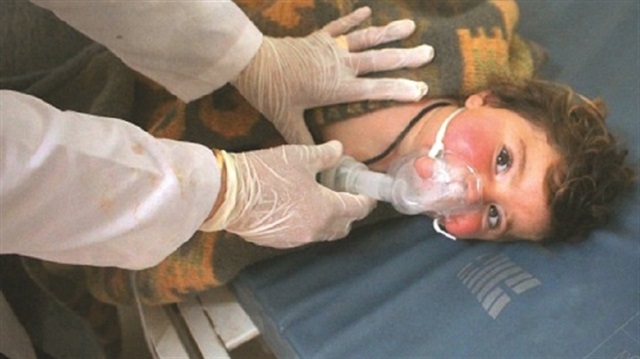
UN finds conclusive evidence that the Syrian government used chemical weapons in an attack on Khan Sheikoun that left 83 people, mostly women and children, dead
Syrian forces have used chemical weapons more than two dozen times during the country's civil war, including in April's deadly attack on Khan Sheikhoun, U.N. war crimes investigators said on Wednesday.
A government warplane dropped sarin on the town in Idlib province, killing more than 80 civilians, the U.N. Commission of Inquiry on Syria said, in the most conclusive findings to date from investigations into chemical weapons attacks during the conflict.
The Commission also said U.S. air strikes on a mosque in the village of Al-Jina in rural Aleppo in March that killed 38 people, including children, failed to take precautions in violation of international law.
The weapons used on Khan Sheikhoun were previously identified as containing sarin, an odourless nerve agent. But that conclusion, reached by a fact-finding mission of the Organization for the Prohibition of Chemical Weapons (OPCW), did not say who was responsible.
"Government forces continued the pattern of using chemical weapons against civilians in opposition-held areas. In the gravest incident, the Syrian air force used sarin in Khan Sheikhoun, Idlib, killing dozens, the majority of whom were women and children," the U.N. report said, declaring the attack a war crime.
In their 14th report since 2011, U.N. investigators said they had in all documented 33 chemical weapons attacks to date.
Twenty seven were by the government of President Bashar al-Assad, including seven between March 1 to July 7. Perpetrators had not been identified yet in six early attacks, they said.
The Assad government has repeatedly denied using chemical weapons. It said its strikes in Khan Sheikhoun hit a weapons depot belonging to rebel forces, a claim dismissed by the U.N. investigators.
That attack led U.S. President Donald Trump to launch the first U.S. air strikes on a Syrian air base.
A separate joint inquiry by the U.N. and OPCW aims to report by October on who was to blame for Khan Sheikhoun.
The U.N. investigators interviewed 43 witnesses, victims, and first responders linked to the attack. Satellite imagery, photos of bomb remnants and early warning reports were used.
The independent investigators, led by Paulo Pinheiro, also said they were "gravely concerned about the impact of international coalition strikes on civilians".
"In al-Jina, Aleppo, forces of the United States of America failed to take all feasible precautions to protect civilians and civilian objects when attacking a mosque, in violation of international humanitarian law," the report said.
A U.S. military investigator said in June that the air strike was a valid and legal attack on a meeting of al Qaeda fighters. It was believed to have killed about two dozen men attending the group's meeting and caused just one civilian casualty.
The American F-15s hit the building adjacent to the prayer hall with 10 bombs, followed by a Reaper drone that fired two Hellfire missiles at people fleeing, the U.N. report said.
"Most of the residents of al-Jina, relatives of victims and first responders interviewed by the Commission stated on that on the evening in question, a religious gathering was being hosted in the mosque's service building. This was a regular occurrence."
"The United States targeting team lacked an understanding of the actual target, including that it was part of a mosque where worshippers gathered to pray every Thursday," it said.


